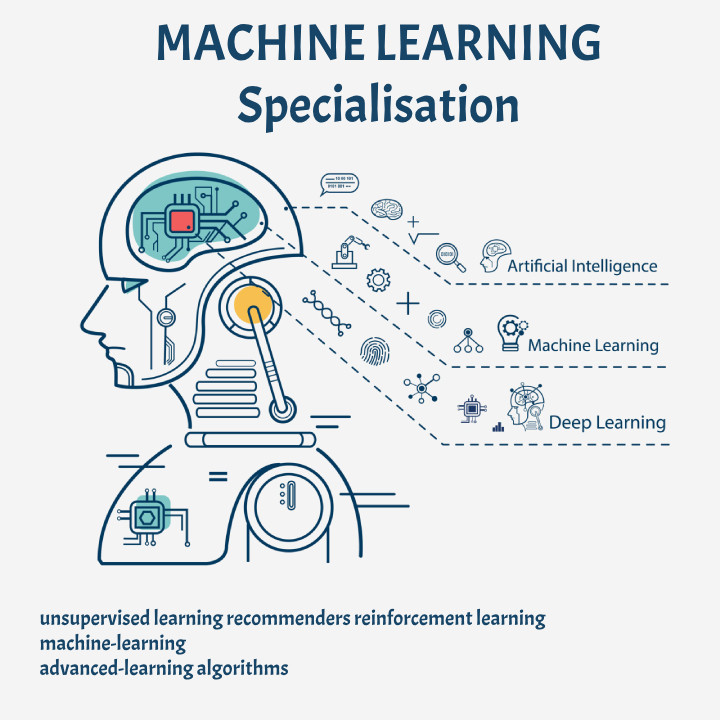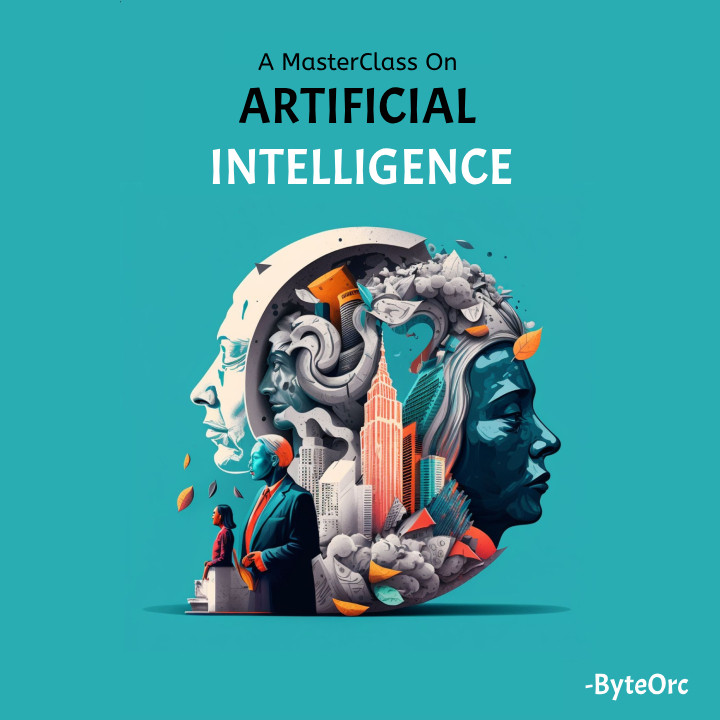-
This Machine Learning Specialization is a comprehensive learning series designed to take you through the fundamentals to advanced techniques of machine learning (ML). Whether you're an aspiring data scientist, a software engineer, or just someone looking to dive deep into ML, this series will provide you with both theoretical knowledge and practical skills to build machine learning models and apply them to real-world problems.
Key Features of the Series
1. Introduction to Machine Learning
- What is Machine Learning and how it differs from traditional programming.
- Overview of supervised learning, unsupervised learning, and reinforcement learning.
- The importance of data and how to prepare it for ML algorithms.
- Understanding the workflow of a machine learning project: data collection, cleaning, modeling, and evaluation.
2. Data Preprocessing and Feature Engineering
- Techniques for data cleaning: handling missing data, outliers, and noisy data.
- Feature selection and extraction to improve model performance.
- Scaling and normalizing data to ensure better model accuracy.
- Encoding categorical data and working with time-series data.
3. Supervised Learning Algorithms
- Linear Regression: Understanding and implementing linear regression for predictive modeling.
- Logistic Regression: Classifying binary outcomes with logistic regression.
- Decision Trees and Random Forests: Building decision trees and using ensemble learning for more accurate predictions.
- Support Vector Machines (SVM): An introduction to SVM for classification problems.
- K-Nearest Neighbors (KNN): Using distance metrics for classification and regression tasks.
4. Unsupervised Learning Algorithms
- Clustering: Introduction to clustering techniques like K-Means and Hierarchical Clustering.
- Principal Component Analysis (PCA): Reducing dimensionality and extracting key features.
- Anomaly Detection: Identifying outliers in data using clustering and classification techniques.
- Gaussian Mixture Models: Probabilistic approach for clustering and density estimation.
5. Neural Networks and Deep Learning
- Introduction to Neural Networks and the basics of perceptrons.
- Understanding Deep Learning and its applications to complex problems like image recognition and natural language processing.
- Building and training Convolutional Neural Networks (CNNs) for image-based tasks.
- Recurrent Neural Networks (RNNs) for time-series prediction and sequential data.
- Transfer learning and pre-trained models for faster implementation.
6. Model Evaluation and Optimization
- Cross-validation to assess model performance and avoid overfitting.
- Confusion Matrix, Precision, Recall, F1-Score to evaluate classification models.
- Hyperparameter Tuning: Using techniques like Grid Search and Random Search to optimize model performance.
- Regularization methods: L1 (Lasso) and L2 (Ridge) regularization to reduce overfitting.
- Understanding the bias-variance tradeoff in model building.
7. Advanced Topics in Machine Learning
- Ensemble Methods: Boosting (e.g., AdaBoost, Gradient Boosting), Bagging (Random Forests), and Stacking.
- Reinforcement Learning: Introduction to RL and how agents learn from interaction with the environment.
- Natural Language Processing (NLP): Applying machine learning to text data, including sentiment analysis and text classification.
- Time-Series Forecasting: Using ML for predictive analytics with time-dependent data.
8. Machine Learning in Practice
- Real-world case studies in industries such as finance, healthcare, retail, and autonomous systems.
- Building a machine learning pipeline from data collection to deployment.
- Deploying machine learning models into production using cloud platforms (AWS, Google Cloud, Azure).
- Understanding the ethical implications of AI and ML, including bias in data and model fairness.
9. Capstone Project
- Apply what you've learned by working on a real-world machine learning project.
- Develop, train, and evaluate a model on a complex dataset.
- Present your findings through a detailed report and visualizations.
- Showcase your project to potential employers or clients.
Who Is This Series For?
- Aspiring Data Scientists looking to gain hands-on experience in machine learning.
- Software Engineers interested in transitioning to data-driven roles.
- Researchers and Analysts who want to leverage machine learning for complex data problems.
- Students looking to build a solid foundation in machine learning for academic or career purposes.



